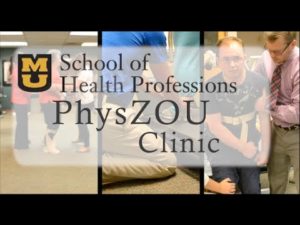 Support Coordinators at Boone County Family Resources work with persons served to create an individual plan of support that best meets their unique needs. The Support Coordinators must be knowledgeable, not only about resources available through BCFR and its providers, but also about community resources that may be beneficial. Two community programs through the University of Missouri School of Health Professions provide hands-on learning opportunities for their students while at the same time providing needed services for individuals seeking access to physical or occupational therapies – all at no cost to the individual.
Support Coordinators at Boone County Family Resources work with persons served to create an individual plan of support that best meets their unique needs. The Support Coordinators must be knowledgeable, not only about resources available through BCFR and its providers, but also about community resources that may be beneficial. Two community programs through the University of Missouri School of Health Professions provide hands-on learning opportunities for their students while at the same time providing needed services for individuals seeking access to physical or occupational therapies – all at no cost to the individual.
For many who access physical therapy or occupational therapy, private insurance and waiver services often only cover a set number of visits which may not allow the individual to achieve the progress they are seeking. PhysZOU, a special  clinic through the Physical Therapy Program at the School of Health Professions, is closing the gap of services for those who are un- or underinsured. In the clinic, which offers its services with no charge, graduate-level physical therapy students are partnered with practicing physical therapy clinicians to work with individuals on their physical therapy goals.
clinic through the Physical Therapy Program at the School of Health Professions, is closing the gap of services for those who are un- or underinsured. In the clinic, which offers its services with no charge, graduate-level physical therapy students are partnered with practicing physical therapy clinicians to work with individuals on their physical therapy goals.
Kaleb, 15, participated in the PhysZOU program for six weeks at the end of last year. “PhysZOU was a very positive experience for Kaleb,” says Mary Ann, Kaleb’s grandmother. “Even in the late afternoon, when Kaleb was already tired from being at school, the students were able to get him to participate in his therapy and have fun. They discovered his love of music and tailored his sessions around his interests.” Mary Ann says Kaleb’s primary physical therapist was the same at each session over the six weeks with different students cycling through as they completed their training. “The students did their best to get to know Kaleb and that makes a difference.” Due to Kaleb’s high school schedule this year, they stopped participating in the program, but Mary Ann says, “I would recommend the program to anyone.”
Abigail, 6, has been participating in the PhysZOU program since she was 3 years old. “Physical therapy has made a huge difference in Abigail’s abilities,” says Kimberly, Abigail’s mother. “When Abigail first started the program she had low muscle tone and poor hand-eye coordination. By the end of her first six-week session, she was jumping off of things.” Kimberly echoes Mary Ann’s comments about the students working to build rapport with their patients. “Abigail is very introverted and shy, but the students got to know her to the point that she calls them her ‘friends.’ I can’t say enough good things about this program.” Kimberly says through private insurance, Abigail is only allowed 20 visits per year. And while she says they appreciate the sessions that insurance covers, a limited number of visits does not provide as much benefit for Abigail. “The PhysZOU program is a great resource for parents. The instructors are very knowledgeable and experienced. They are making a difference for Abigail.”
Abigail also participates in a no-cost handwriting class through TigerOT, the other community program offered through the MU School of Health Professions. In a similar manner as PhysZOU, the TigerOT program pairs instructors with students in a clinical setting to provide occupational therapy to those either unable to access it due to cost or those who could benefit from additional therapy.
Abigail started the handwriting class at the beginning of this year. It consists of 10-12 preschool through kindergarten-age kids who meet once a week to work on strategies for improving handwriting. “What impressed me the most about this class is that they did an evaluation before they started working with Abigail and they will complete an evaluation at the end of the semester to show her progress,” says Kimberly. “She has weekly homework assignments which mostly consist of practice sheets. This has made a big difference in her handwriting skills. Both of these programs are really worth it and I would highly recommend them to anyone who needs PT or OT.”
Jameson, 4, just started attending one-on-one therapy sessions with TigerOT. “Things are going great so far, but we only just got started,” says Sabra, Jameson’s mother. “We are working with an occupational therapist that we previously saw at another provider, so they already know Jameson and he knows them. Occupational therapy in general has been great for Jameson. They have helped him try new foods that he would have otherwise never allowed. I hope to have positive results to report when we complete the TigerOT sessions in May.”
In addition to one-on-one occupational therapy through TigerOT, the MU Occupational Therapy Department also provides in-home assessments designed to promote safety and independence. The assessment often leads to recommendations for making changes in the home, changes in ways to complete household tasks, and suggestions for adaptive equipment. There is a charge for this particular service, but it is something that BCFR can fund for persons served. Families with questions about any of these community programs should speak with their support coordinator for further information.